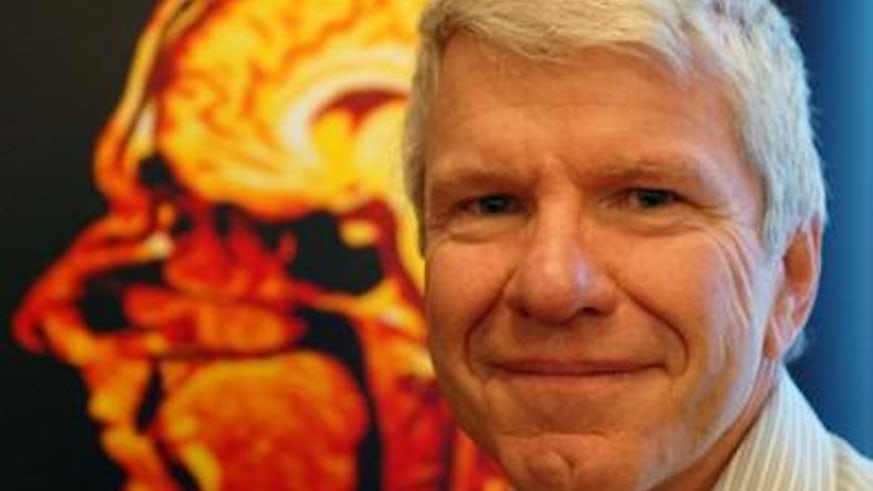Flagship centre secures funding renewal
13 August 2014

Funding renewal for Wales's leading research centre examining the genetics of mental illness will help 'nurture the next generation of world-leading scientists', according to Cardiff University's Professor Sir Michael Owen.
Wales's leading Medical Research Council centre, The MRC Centre for Neuropsychiatric Genetics and Genomics (MRC CNGG), based at the University's flagship Hadyn Ellis Building, has secured additional funding over the next five years.
Officially opened in 2009 by the then First Minister Rhodri Morgan, the MRC Centre plays host to some of the world's leading experts researching psychiatric disorders like bipolar disorder and schizophrenia, childhood psychiatric disorders like ADHD and depression and neurodegenerative disorders such as Alzheimer's disease and Parkinson's.
"We are delighted to have secured funding renewal from the MRC to continue our vital work. This is a vote of confidence in our research and the work we are doing to help bring forward the next generation of world-leading scientists" according to the Centre's Director, Professor Sir Michael Owen.
"We use the latest advances in genetics to understand what puts people at risk of brain disorders, before bringing to bear cutting edge epidemiology and neuroscience to work out exactly how genes affect the development and function of the brain.
"Ultimately, this will allow researchers to build up enough knowledge to inform new and better treatments for mental health conditions, which can affect as many as 16M people in the UK at any one time," he adds.
As well as playing host to some of the world's best minds a key element of the work of the MRC Centre is to support and nurture the next generation of scientists.
Bursaries from the MRC and Cardiff University provide the next generation of young researchers with the means to develop innovative new ways of treating and diagnosing mental health disorders for the future.
"Being able to encourage, support and nurture is crucial if we are to produce the next generation of world-leading scientists here at Cardiff," Professor Owen added.
One student already benefiting from being part of the MRC Centre is Katie Swaden Lewis from Merthyr.
Katie is a second year PhD student at the centre studying bipolar disorder.
"I research the effects of sleep on bipolar. Specifically, I look at whether changes in sleep patterns could be used as an early warning sign of symptoms," explains Katie.
"I ask volunteers to wear special watches, similar to the fitness wristbands that many people use while exercising, to measure their sleep patterns. "I also plan to look at pairing the information I've collected on people's sleep patterns with their genetic data, so that we can work out which individuals are sensitive to sleep loss and understand what genetic factors may be involved."
"My findings could lead to ways of using existing technology to monitor sleep and alert people with bipolar disorder when they might be at risk of relapse, particularly in those who are genetically prone to sleep loss. It could also be used to provide them with advice on what to do next, or even alert medical professionals or carers," she adds. Katie believes that the support and facilities provided by the MRC Centre are vital to her work, and to the development of new strategies for diagnosing and treating mental health disorders.
Katie PHD student_web 175px
Katie adds: "Being part of the MRC Centre in Cardiff has made a huge difference to my work and my career. Apart from obviously funding my research, it's given me access to all the equipment and resources I need, and I'm able to take advantage of the fact that there are so many researchers in different fields working under the same roof, including some world renowned experts. I think having access to those different perspectives really improves the quality of what we do."
As well as undertaking high quality research and developing their own careers, Katie and many of the centre's other PhD students are also involved in public engagement work to help encourage others into science.
Katies adds: "I've volunteered at the Cheltenham Science festival, which involved talking to young people about Elsie Widdowson, a scientist in WWII who researched the effects of food rationing and established a lot of what we know today about nutrition.
"I thought this was a great way to show young girls that women can do pioneering work too, even though science has traditionally been very male-dominated. This year, I'm also going to be involved in the "Life Sciences Challenge", a science quiz competition for Year 10 students. "It's important that we engage with young people on the sciences, as they will be the next generation of researchers who will take our work forward to the next level, and hopefully change people's lives for the better in the future," she added.